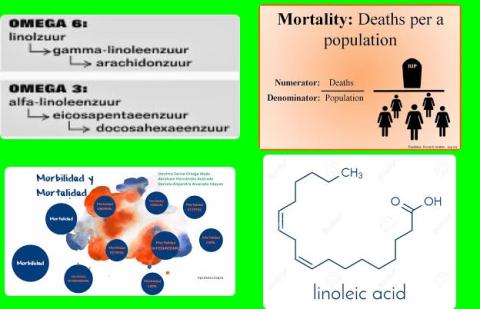
Objectives:
Current evidence on associations between intakes of linoleic acid (LA), the predominant n-6 (ω-6) fatty acid and mortality is inconsistent and has not been summarized by a systematic review and meta-analysis. Therefore, this review article has been conducted.
Does higher linoleic acid intake, assessed by dietary surveys or biomarkers decrease mortality from all causes, cardiovascular disease (CVD) and cancer?
Study design:
This review article included 44 prospective cohort studies with 811,069 participants with dietary intake assessment (170,076 all-cause, 50,786 cardiovascular disease and 59,684 cancer deaths) and 65,411 participants with biomarker measurements (9,758 all-cause, 6,492 cardiovascular disease and 1,719 cancer deaths).
Meta-regressions suggested baseline age and dietary assessment methods as potential sources of heterogeneity for the association between linoleic acid and total mortality.
Results and conclusions:
The investigators found when compared with the lowest categories of dietary linoleic acid intake, that the highest categories of dietary linoleic acid intake significantly reduced total mortality risk with 13% [pooled RR = 0.87, 95% CI = 0.81 to 0.94, I2 = 67.9%].
The investigators found when compared with the lowest categories of dietary linoleic acid intake, that the highest categories of dietary linoleic acid intake significantly reduced cardiovascular disease mortality risk with 13% [pooled RR = 0.87, 95% CI = 0.82 to 0.92, I2 = 3.7%].
The investigators found when compared with the lowest categories of dietary linoleic acid intake, that the highest categories of dietary linoleic acid intake significantly reduced cancer mortality risk with 11% [pooled RR = 0.89, 95% CI = 0.85 to 0.93, I2 = 0%].
The investigators found for each standard deviation increment in linoleic acid concentrations in adipose tissue/blood compartments a significantly reduced total mortality risk of 9% [pooled RR = 0.91, 95% CI = 0.87 to 0.95, I2 = 64.1%].
The investigators found for each standard deviation increment in linoleic acid concentrations in adipose tissue/blood compartments a significantly reduced cardiovascular disease mortality risk of 11% [pooled RR = 0.89, 95% CI = 0.85 to 0.94, I2 = 28.9%].
The investigators found for each standard deviation increment in linoleic acid concentrations in adipose tissue/blood compartments a significantly reduced cancer mortality risk of 9% [pooled RR = 0.91, 95% CI = 0.84 to 0.98, I2 = 26.3%].
The investigators concluded higher linoleic acid intake, assessed by dietary surveys or biomarkers, reduces risk of mortality from all causes, cardiovascular disease and cancer. These data support the potential long-term benefits of PUFA intake in lowering the risk of cardiovascular disease and premature death.
Original title:
Dietary intake and biomarkers of linoleic acid and mortality: systematic review and meta-analysis of prospective cohort studies by Li J, Guasch-Ferré M, […], Hu FB.
Link:
https://www.ncbi.nlm.nih.gov/pubmed/32020162
Additional information of El Mondo:
Find more information/studies on linoleic acid intake and mortality right here.
Linoleic acid is a PUFA.